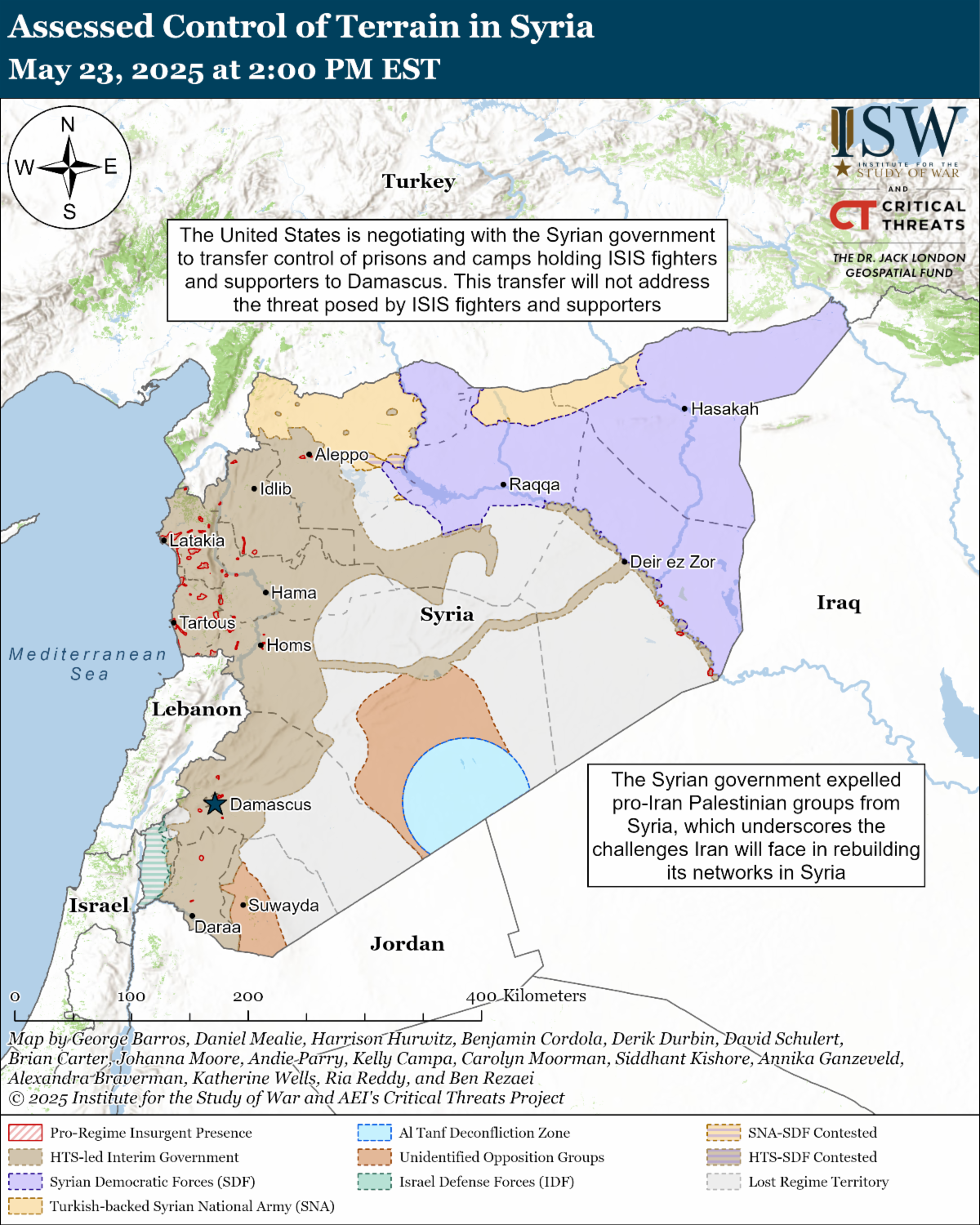Iran may try to secure an interim nuclear deal before negotiating a comprehensive nuclear agreement to delay or prevent a US or Israeli strike on Iranian nuclear facilities and the imposition of snapback sanctions by the E3 (the United Kingdom, France, and Germany), as CTP-ISW previously assessed. The Wall Street Journal reported on May 23 that the United States and Iran are considering negotiating a framework deal, citing unspecified individuals familiar with the US-Iran nuclear negotiations. An unspecified senior official familiar with the negotiations told the WSJ that the goal would be "to establish an understanding on the key points that would constitute a final agreement.”
Iran and the P5+1 (the United States, the United Kingdom, China, France, Russia and Germany) reached an interim deal in 2013 that froze elements of Iran’s nuclear program in exchange for temporary sanctions relief prior to further negotiations that led to the Joint Comprehensive Plan of Action (JCPOA) in 2015. Iran agreed to eliminate its 20 percent enriched uranium stockpile, refrain from operating any inactive centrifuges, halt the production and installation of new centrifuges, cease construction of the Arak heavy water reactor, and accept new International Atomic Energy Agency (IAEA) oversight measures in the 2013 interim deal. It is unclear what concessions Iran would be willing to make for an interim deal in the current nuclear negotiations.
The United States and Iran held their fifth round of nuclear talks in Rome on May 23. US Special Envoy to the Middle East Steve Witkoff and Iranian Foreign Affairs Minister Abbas Araghchi led the US and Iranian delegations, respectively. Omani Foreign Minister and lead mediator Badr Albusaidi said the latest round of nuclear talks ended with "some but not conclusive progress." Two unspecified Iranian sources separately told CNN that Iran is participating in the fifth round of talks to gauge the Trump administration's position, likely referring to the US demand for zero uranium enrichment, which continues to be the main sticking point in the US-Iran nuclear negotiations. Araghchi posted on X (Twitter) on May 22 that zero enrichment means ”we do not have a deal." Technical teams accompanied both the US and Iranian delegations, which suggests the talks covered technical issues such as Iranian uranium enrichment levels. CTP-ISW previously assessed that disagreements between Iran and the United States about the issue of zero uranium enrichment may stall the negotiations or delay a deal. Iran and the United States could agree to an interim or framework deal that does not explicitly include the US demand for zero uranium enrichment.
Key Takeaways:
- US-Iran Nuclear Negotiations: Iran may try to secure an interim nuclear deal before negotiating a comprehensive nuclear agreement to delay or prevent a US or Israeli strike on Iranian nuclear facilities and the imposition of snapback sanctions by the E3 (the United Kingdom, France, and Germany), as CTP-ISW previously assessed.
- Iranian Military Learning: The Artesh Ground Forces deputy commander unveiled new tactical drones on May 22 in Sistan and Baluchistan. The new drones, which were developed by the Artesh, may reflect some lessons observed from the Russian Invasion of Ukraine. The new drones will probably contribute to the development or implementation of new tactics to counter anti-regime militant groups, including the Baloch Salafi-jihadi militant group Jaish al Adl that regularly attacks Iranian security forces and infrastructure in southeastern Iran.
- US-Syria Relations: The United States is negotiating with the Syrian government to transfer control of detention facilities and camps holding Islamic State of Iraq and Syria (ISIS) fighters and supporters to the government. An agreement to transfer these ISIS fighters and supporters to Syrian government control would not decrease the threat they pose to the United States, however. The Syrian government would very likely require significant support to successfully secure these facilities, just like the SDF does.
- Syria and Palestinian Groups: The Syrian government expelled pro-Iran Palestinian groups from Syria, which underscores the challenges that Iran will face in rebuilding its networks in Syria. A Palestinian faction leader told AFP that Palestinian leaders have evacuated to Iraq, Yemen, and Lebanon after their expulsion from Syria.
- Syria and Russia: A Syrian armed group claimed a May 20 attack on Russian forces at Hmeimim air base and gave the Russians one month to leave Syria before it attacks again. This group’s threat to attack Russian forces if they do not withdraw from Syrian territory within one month is unlikely to compel the Russians to withdraw.
| 




 [ISW] 러시아의 공세 캠페인 평가, 2025년 5월 24일
[ISW] 러시아의 공세 캠페인 평가, 2025년 5월 24일